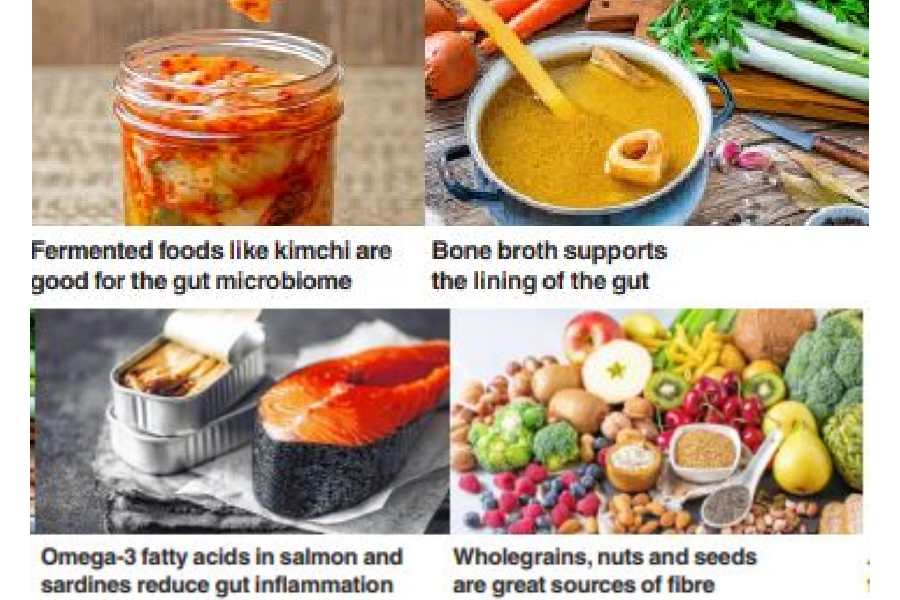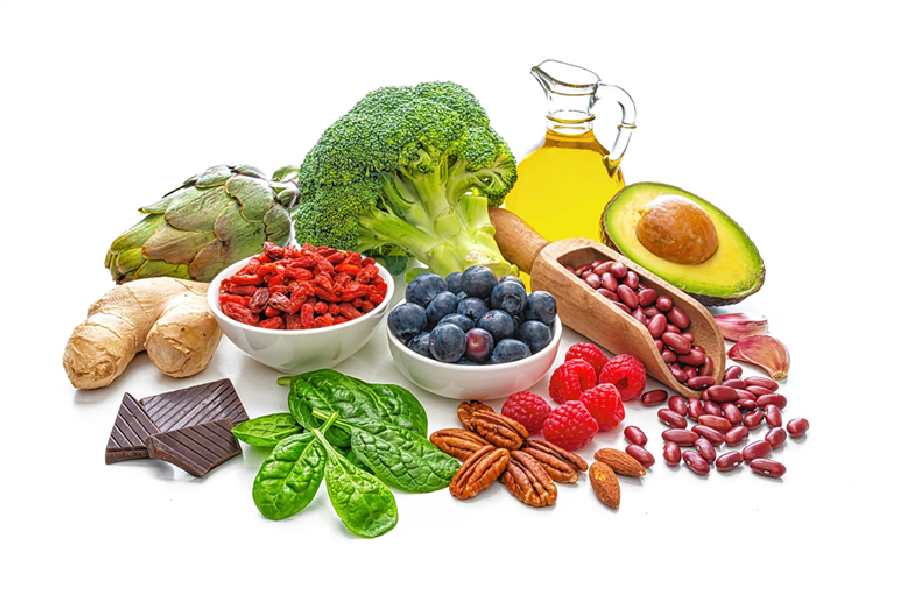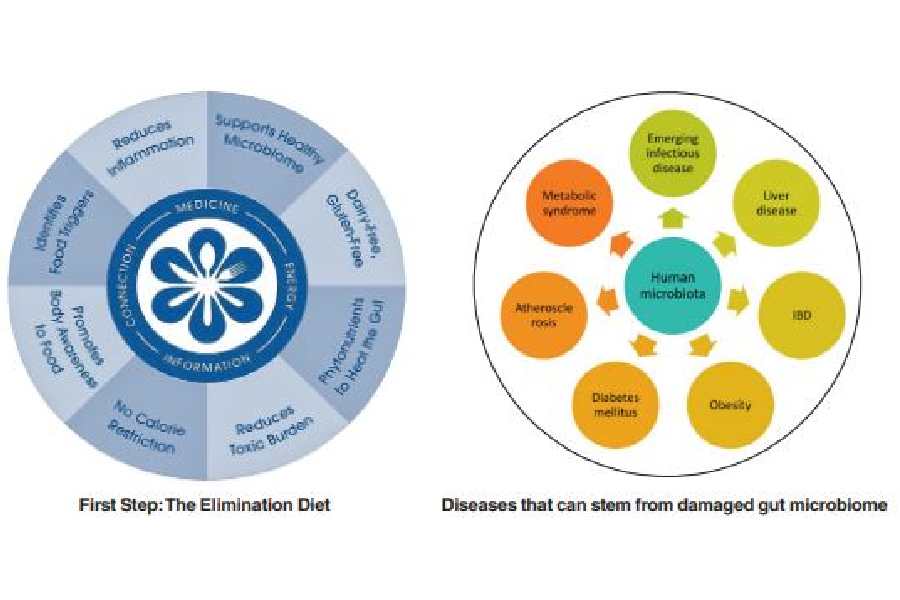A naturopathic maxim says: “Death begins in the colon.”The practical application is: “When in doubt treat the gut.”
A ‘health first’ approach is now the new normal.
Interestingly, health, or the lack thereof, begins with your gut. Many years ago Hippocrates had famously said that “disease starts in the gut”. Most of the ancient healing systems also believed that it’s the gut which has the power to keep us healthy. In fact, the number one reason for doctor’s visits continues to be related to the gut — digestive problems, irritable bowel, reflux, heartburn, bloating and constipation.
GUT FACTS
*The most important system in your body is your gut. The gut contains your microbiome, sends direct signals to the brain, and can impact your cognitive and emotional well-being, not to mention that it also helps you digest your food and extracts the vitamins and minerals that your body needs from it.
*It is the largest immune system in the body; 70 per cent of the cells that make up the immune system sit in its walls.
*It houses a genome that is 100-150 times larger than the human genome.
*And this is just the tip of the iceberg. Your gut health and the bacteria that make up the microbiome impact your brain chemistry, immune system, your weight, risk of heart disease, cancer, dementia, Parkinson’s, autism, ADHD and depression, among others. You name it, everything is connected to your gut.
*The gut’s metabolic functions are comparable in magnitude to those of the liver.
*The most effective clinical outcomes across all disease spectrums can result from normalisation of gut health.
MICROBIOME,THE HIDDEN KEY
What you feed your gut and how it shapes the bacteria, or gut flora, in your microbiome matters a lot for maintaining optimal health and wellness. Your gut grows an inner garden of bugs — good bugs, bad bugs — and these impact your body in a big way. So learning to tend to your inner garden is a huge piece of your basic health maintenance. How do you feed those bugs and keep them happy? How do you take care of them?


Antioxidant polyphenol-rich foods support gut health
An unhealthy gut is either a leaky gut or one with dysbiosis. Leaky gut happens when there is a breakdown in the barrier in intestinal lining, leading to an inflammatory reaction in the immune system and causing conditions like weight gain, autoimmune disease, heart disease, diabetes, cancer and Alzheimer’s. On the other hand, the growth of bad microbes in the gut can have a substantial impact on the nervous and immune systems, contributing to the onset of several inflammatory diseases.
Moreover, other conditions like migraine, atopic dermatitis, allergies and autoimmune diseases also result from imbalance in the gut microbiome. Although they do not manifest as gut symptoms, they get better when you treat the gut. This is why in functional medicine we always treat the gut first.
REASONS FOR POOR GUT HEALTH
*Today, a third of all births are C-sections. So, the baby doesn’t go through the vaginal canal and get the microbiome colonised by the mother’s vaginal flora. Moreover, lack of breastfeeding, along with early use of antibiotics, acid-blocking drugs, anti-inflammatories, and oral contraceptives by the mother affect the baby’s gut health after birth.
*Consuming gluten present in genetically modified wheat is another leading cause of an unhealthy gut. The gluten and gliadin protein content of this modern wheat is so high that it triggers an increase in zonulin protein, which breaks down the gut lining and causes a leaky gut that is medically referred to as intestinal permeability.

*Our modern lifestyle has also led to a lot of gut issues. Historically, we ate 800 different species of plants, but today, the average diet consists basically of three or four crops; 60 per cent are rice, corn, wheat and soy and then maybe a few vegetables, a total of maybe 10 to 12 plants. This has stressed the gut.
*Moreover, consuming junk/processed food and drugs like antibiotics, antacids, NSAIDs, along with issues of stress, poor quality sleep, and anxiety on a regular basis has also potentially triggered adverse effects on the gut.
THE 5R PROGRAM
In functional medicine, we use a program that goes by the simple acronym of 5R: remove, replace, reinoculate, repair and rebalance. When applied to various chronic health issues, the 5R program can lead to a dramatic improvement in symptoms and sometimes even complete resolution. The elements of the 5R program are described briefly here.
1. Remove: Remove stressors. Get rid of things that negatively affect the environment of the gastrointestinal (GI) tract, including foods you are sensitive to, parasites, and potentially problematic bacteria or yeast. This might involve using an elimination diet to find out what foods are triggering GI symptoms. It may also involve taking medications or herbs to get rid of an infection.
2. Replace: Replace digestive secretions. Add back things like digestive enzymes, bile acids, and hydrochloric acid that are required for proper digestion and that may be compromised by diet, medications, diseases, ageing, or other factors.
3. Reinoculate: Help beneficial bacteria flourish by eating probiotic-rich foods or taking supplements that contain “good” bacteria, such as Bifidobacteria and Lactobacillus species, and by eating high-fibre foods.
4. Repair: Help the lining of the GI tract repair itself by supplying key nutrients that are often in short supply in a compromised gut, such as zinc, antioxidants (such as vitamins A, C, and E), omega-3 fish oils, and the amino acid glutamine.
5. Rebalance: It is important to pay attention to lifestyle choices. Sleep, exercise, and stress can all affect the GI tract. Managing and balancing those factors helps promote optimal digestive tract health.
FOODS THAT SUPPORT GUT HEALTH
Functional medicine recognises the importance of gut health for overall wellness and certain foods can help support a healthy gut. Here are some examples of foods that are beneficial for gut health according to functional medicine.
Fermented foods: Foods such as kefir, kimchi, sauerkraut and yoghurt contain live bacteria that can help improve gut microbiota diversity and function.
Prebiotic foods: Prebiotics are types of fibre that promote the growth of beneficial bacteria in the gut. Foods such as onions, garlic, leeks, asparagus, bananas and apples are great sources of prebiotic fibre.
Bone broth: Bone broth is rich in collagen and amino acids which can help support the lining of the gut and improve gut health.
Omega-3 fatty acids: Foods such as wild-caught salmon, sardines, and chia seeds are great sources of omega-3 fatty acids, which can help reduce inflammation in the gut.
Fibre-rich foods: Fibre is important for maintaining healthy bowel movement and promoting the growth of beneficial gut bacteria. Foods such as whole grains, nuts, seeds and vegetables are great sources of fibre.
Polyphenol-rich foods: Polyphenols are plant compounds that have antioxidant and anti-inflammatory properties. Foods such as berries, pomegranate, broccoli, turmeric, rosemary, dark chocolate and green tea are great sources of polyphenols and can help support gut health.
FOOD FOR THOUGHT
As Hippocrates rightly put it, “It is necessary to treat not only the disease but also to counteract the causes that cause it.”The human gut is complex, but there is good evidence that behavioural changes can make a major difference, not only for your gut health but also your overall health.
That said, breaking your current habit cycles isn’t exactly easy, but relief from symptoms and chronic disease is worth the effort. Food is a powerful tool for change and focusing on root causes, like nutrient deficiencies, consuming over-processed foods or even something outside of your diet, can have immediate and profound effects on your gut health, which ensure considerable safety from a host of diseases and ailments.
“Let food be thy medicine and medicine be thy food,” said Hippocrates. Amen to that.
Puja Karnani Agarwal is a functional medicine practitioner, certified human performance nutritionist, and a REPS-certified Level-4 trainer. She is on Instagram @pujakarnaniagarwalofficial and her website is pujakarnaniagarwal.com
